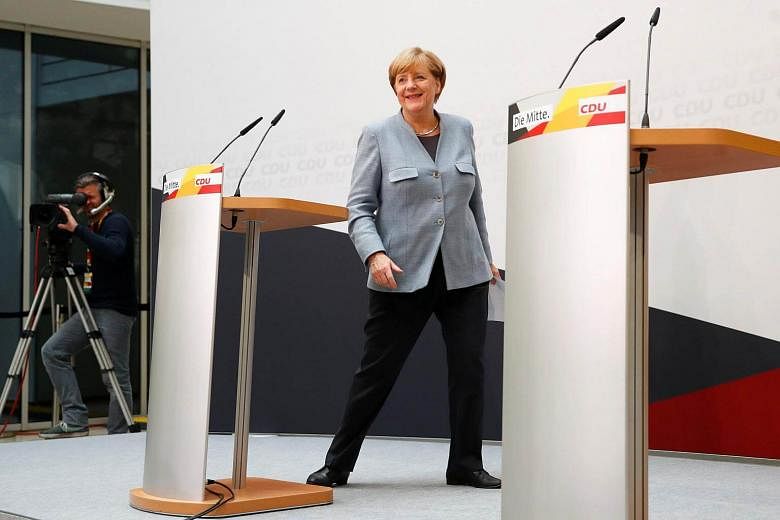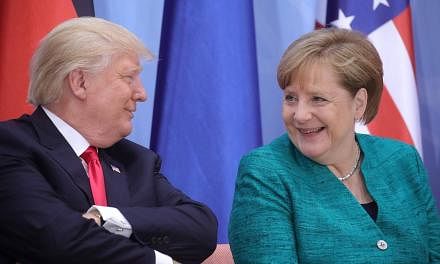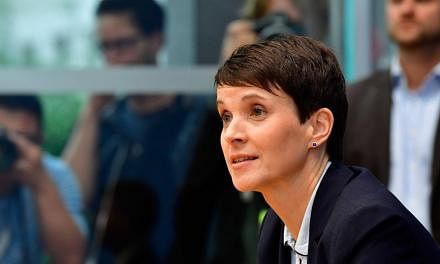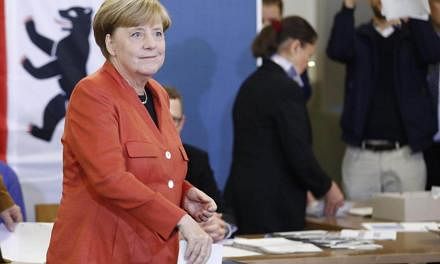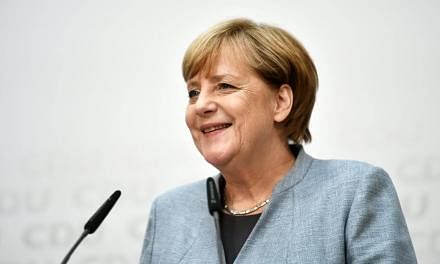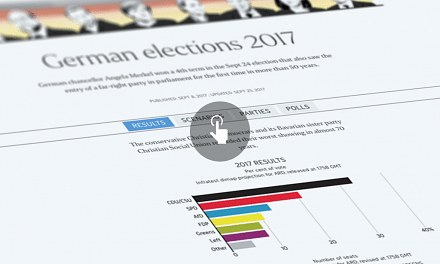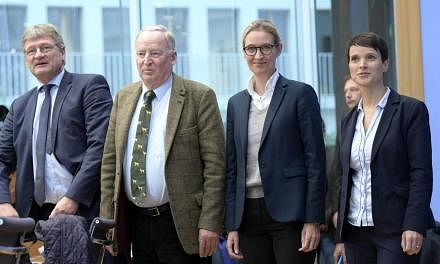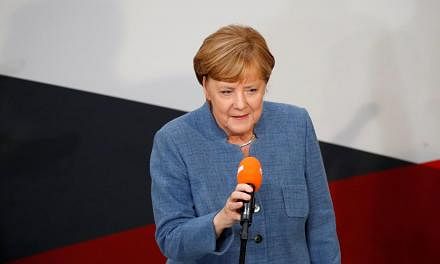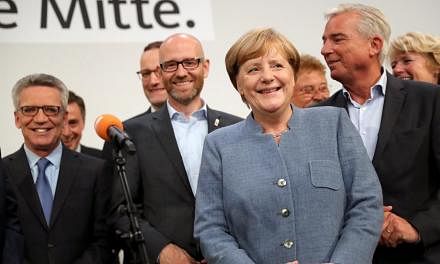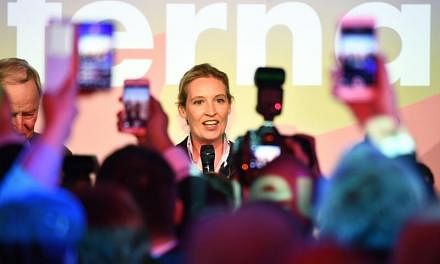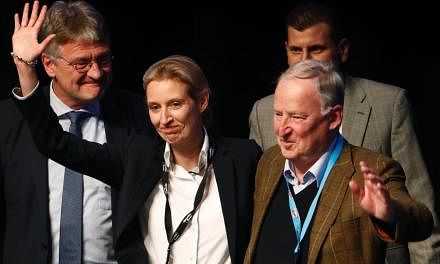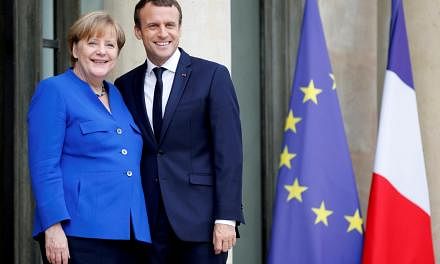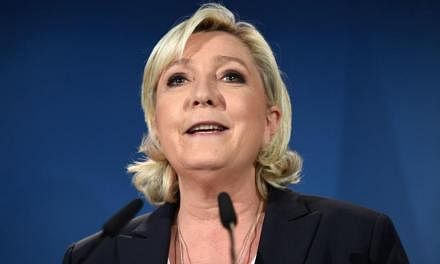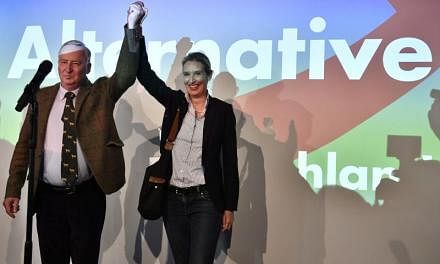Leaders of Germany's right-wing, anti-immigrant movement who came out of nowhere to become Germany's third-largest party after Sunday's general election have pledged to fight the "invasion of foreigners" and vowed to "hound" Chancellor Angela Merkel for her decision to admit refugees from conflict zones.
"One million people, foreigners, being brought into this country are taking away a piece of this country, and we don't want that," said Mr Alexander Gauland, co-chair of the Alternative for Germany (AfD), which has shocked the country's political establishment by winning 12.6 per cent of the popular vote on Sunday and is now slated to control 94 of the 700 seats in Parliament.
The aggressive language, unprecedented in modern German politics, is a harbinger of the difficulties facing Dr Merkel in the years to come. For although she should be able to remain in office for a fourth consecutive term, she may find it difficult to head off the popular backlash which the rise of the AfD represents.
Both the Chancellor's centre-right Christian Democratic Union (CDU) and its main rival, the Social Democrats led by Mr Martin Schulz, are big losers in the election. Statistically, the ruling CDU recorded the biggest loss, with its share of the vote down from 41.5 per cent in 2013 to a mere 33 per cent now, the worst such result since Dr Merkel took the party's helm.
But the Social Democrats crashed from 25.7 per cent of the vote in 2013 to just 20.5 per cent now, the worst such result for Germany's oldest established party since the Nazis came to power in 1933.
Dr Merkel now faces the task of forging a coalition government with the small Liberals, which received 10 per cent of the vote, and the Greens ecologist movement, with 9 per cent. That is commonly referred to as the "Jamaica option", as the colours of the three parties match those of the flag of the Caribbean nation.
In theory, that is perfectly feasible: Both the Liberals and Greens participated in governments before, and both are eager to return to power. The snag for Dr Merkel is that such a coalition is unlikely to "win back" - as she put it - the estimated one million CDU supporters who defected to the far-right AfD, which now represents the biggest challenge to Germany's existing political system.
The AfD is not the first far-right party to make it into modern Germany's Parliament. Nor is it a "Nazi" movement, as some German commentators like to portray it. Still, it is the most successful populist movement since the current federal republic was established out of the ashes of old Germany after World War II, and it clearly taps real national grievances. It draws most of its support from men, and especially those from the poorer former communist eastern parts of Germany, as well as from the devoutly Christian and rural Bavaria. All these segments of the electorate feel threatened by the influx of migrants, and especially the one million refugees who Dr Merkel admitted within a few summer months in 2015.
Dr Merkel assumed that the 2015 episode was long forgotten. Since then, she has considerably tightened border controls and implemented various restrictions on migrants; a ban on women wearing veils while driving has just come into force. But that was clearly just wishful thinking; those who were infuriated by her decision to open the country's borders have not extracted their payback.
The new German government could try to deflate the right-wing wave by tightening border controls even further. But that is unlikely to be accepted by the Greens, who are co-led by a German of Turkish origins and who passionately believe in Germany's global humanitarian vocation. Making no concessions to the AfD is almost certain to be one of the Greens' conditions for entering a coalition.
Dr Merkel could instead ignore the AfD altogether. The party may be the third-largest in Parliament, but is likely to be shunned by everyone. Yet, that will not be wise either, for the AfD relishes its outsider status, and may well grow as a result. Besides, it is branching out to other policies; its manifesto calls for the scrapping of the inheritance tax, a move popular with many middle-class voters.
Dr Merkel's biggest hope is that after its initial success, the AfD will simply implode. Its leaders obviously disagree about their future course. One of them, Ms Frauke Petry, yesterday criticised her colleagues for promising to "hound" the Chancellor, and announced that she would not sit with the party in Parliament.
Yet, even if the AfD proves to be an ill-disciplined foe, it will remain a formidable one for Dr Merkel. For the AfD is determined to question everything Germany stands for, including its commitment to a tightly-knit European Union.
A mere few days ago, Dr Merkel thought she was cruising to an easy re-election. Instead, she ended up with a hollow victory.
